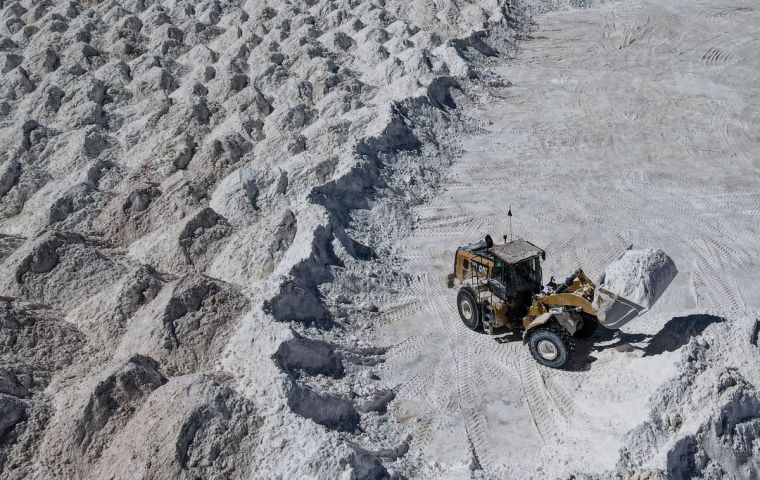MercoPress. South Atlantic News Agency
Chile announces national lithium strategy
 “I have no doubt that we can do it well,” Boric said. Photo: GETTY IMAGES
“I have no doubt that we can do it well,” Boric said. Photo: GETTY IMAGES Chilean President Gabriel Boric Font Thursday launched a new state lithium policy which includes the creation of the National Lithium Company and the participation of private companies in new developments. Chile is the world's second-largest lithium producer, behind Australia.
However, the Chilean State will have majority participation in strategic projects and the National Copper Corporation (Codelco) will have to seek an agreement with the current operators of the Atacama salt flat, it was announced in Santiago.
“An anticipated state participation in the Atacama salt flat will be the result of an agreement with those who currently have the rights to exploit the lithium,” Boric said while instructing Codelco to start negotiations, particularly with SQM, whose contract expires in 2030.
In a broadcast message, Boric outlined his lithium strategy's five axes to place lithium production under State control while renegotiating the agreements with SQM and Albemarle, the two companies that currently produce lithium in Atacama.
“Our challenge is for our country to become the main lithium producer in the world, thus increasing its wealth and development, distributing it fairly, while at the same time protecting the biodiversity of the salt flats,” said Boric, who cited in his speech the Chilean copper nationalization in the times of Eduardo Frei Montalva and the nationalization of the industry in 1971, during the government of Salvador Allende.
Boric's five axes include the creation of a National Lithium Company, private entrepreneurship involvement, new lithium extraction technologies, the participation of the communities surrounding the sites, and the generation of products with added value.
“Given its relevance in lithium production and reserves, the Atacama salt flat deserves special attention in our strategy,” said Boric.
Today two private companies operate in the Salar de Atacama: SQM and the US-based Albemarle. The former sold 157,000 metric tons of lithium carbonate last year, 75% of Chile's production in 2022. Albemarle produced about 50 thousand tons, 25% of Chilean production. SQM has 20% of the world's production and its contract ends in 2030.
Boric also stressed that his policy “has to be built in response to the climate crisis and, therefore, guaranteeing the least possible environmental impact on these ecosystems.”
“We will make a profound difference in the human and technological development of the country from the State if we do it well. And I have no doubt that we can do it well,” he said.
Although there are more than 50 salt flats in Chile, only one is currently being exploited: Atacama, the largest in Chile and the third largest in the world, which concentrates 90% of the country's lithium reserves.
In 2022, the State received more than US$ 5 billion for the exploitation of this mineral, equivalent to 1.6% of the GDP, according to the Autonomous Fiscal Council (CFA). In 2022, there were sales of lithium carbonate abroad for US$ 7.763 billion, an increase of 777% over 2021, according to the Chilean Central Bank. Lithium carbonate surpassed salmon, iron, and cherries in the Chilean export basket.


Top Comments
Disclaimer & comment rulesCommenting for this story is now closed.
If you have a Facebook account, become a fan and comment on our Facebook Page!